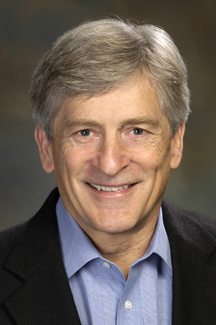Letter from the President
Dear Friends and Colleagues,
As we approach the end of 2014, it is my pleasure to send you season’s greetings, and share my reflections about our accomplishments of the past year and my optimism for the future of The Scripps Research Institute (TSRI).
This year, TSRI continued to be recognized around the world for its research. As highlighted in this issue of News&Views, high-profile findings ranged from inventing a breakthrough method to disrupt a gene involved in a majority of cancers to developing new chemical transformations with profound implications for drug development. Our work was featured in the top journals in chemistry and life sciences, including nine publications in Science, nine in Nature and four in Cell. The work of Floyd Romesberg and his group on expanding the genetic code was voted by readers of Science as People’s Choice Breakthrough of the Year.
Wide public exposure also came from TSRI discoveries that addressed unmet medical needs. The Ebola crisis drew much attention to the research of Erica Ollmann Saphire, who, working with TSRI colleague Andrew Ward, identified weak spots on the surface of Ebola virus targeted by ZMapp, the experimental drug cocktail administered to several U.S. patients. In addition, multiple sclerosis and ulcerative colitis patients were given new hope by positive results from mid-stage clinical trials from RPC1063, an SP1-receptor inhibitor identified by Scripps Florida’s Molecular Screening Center, developed by TSRI Professors Ed Roberts and Hugh Rosen and licensed to Receptos to advance the drug candidate through the approval process.
The high quality of TSRI’s faculty was acknowledged this year with numerous awards, honors and rankings that bring recognition to TSRI. To name a few, Dale Boger and Benjamin Cravatt were elected to the National Academy of Sciences and Gerald Joyce was elected to the National Academies Institute of Medicine. Chi-Huey Wong won the Wolf Prize in Chemistry. Erica Ollmann Saphire was elected to both the American Association for the Advancement of Science and American Academy of Microbiology. In addition, based on citations per paper Thomson-Reuters listed 11 TSRI faculty members as among the “World’s Most Influential Scientific Minds.
Also this year, U.S. News & World Report reaffirmed that TSRI’s Kellogg School of Science and Technology is among the nation’s best in the biological and chemical sciences. The program is now ranked second in the specialty of biochemistry, sixth in the specialty of organic chemistry, seventh overall in chemistry and ninth overall in the biological sciences. We applaud the faculty, students, alumni and donors that have built the Kellogg School’s well-deserved reputation for excellence.
Notable among our philanthropic supporters this year are the late Jean and Keith Kellogg, committed friends of higher education who provided more than $5 million in support to TSRI over time through outright and planned gifts. Jean passed away earlier this year, and has further enriched the Kellogg family legacy at TSRI by providing a bequest that will be used to support first-year graduate students and Alzheimer’s disease research. This year we renewed our collaboration with the International AIDS Vaccine Initiative (IAVI) to extend our joint work at the Neutralizing Antibody Center (NAC) for the next five years, supported by $6.5 million in funding in 2014, which includes approximately $4.4 million from the Bill & Melinda Gates Foundation. The Gates Foundation also provided TSRI with up to $3 million in direct support for operations and equipment, including the powerful new Titan cryo-electron microscope. We deeply appreciate gifts from all our donors.
At TSRI we have continued to be successful in the keen competition for funding. Awards this year included a $28 million National Institutes of Health (NIH) award to establish a center for excellence at TSRI to find the most successful antibody “cocktail” to fight Ebola; an NIH grant of $13 million to study antibodies against HIV in conjunction with the IAVI; and $7.9 million in funds from the Department of Defense to researchers on both the California and Florida campuses to build what is, in essence, an artificial immune system to detect or neutralize an array of biological and chemical threats.
As we celebrate the 10th anniversary of Scripps Florida this year it is also notable that our Florida faculty have brought in a total of more than $412 million in grants and gifts from federal sources, foundations and donors, as well as generating more than 100 domestic and foreign patent applications and 40 technology licenses. We take pride in these accomplishments and look forward to our next 10 years as part of the Florida community.
Discoveries from both campuses have produced a robust pipeline of diagnostic and therapeutic products that provide the potential for future licensing revenues. In this regard, reports of clinical efficiency of RPC1063 provide the most recent evidence that recently approved drugs and those in late-stage clinical trials will contribute to revenues in coming years and help secure a sustainable future for TSRI.
On a personal note, I am proud to be a member of this institute and want to thank all of you for your support in this time of transition. We emerged from months of turmoil with a Board of Trustees and faculty united in the goal to define a sustainable future for TSRI as an independent research institute. I am confident we will find a path to achieve that goal and emerge stronger than ever. We have reinstituted the Faculty Council and are building a culture of transparency. This will serve us well in the coming months as we go forward and as we search for a permanent president and CEO.
It is my privilege to acknowledge all of you—faculty, staff, students, postdocs, supporters and friends of the institute—for making this year’s scientific achievements possible, and to ask for your continued commitment to work together as we usher in the new year.
Warm regards,
Jim Paulson
Send comments to: press[at]scripps.edu














